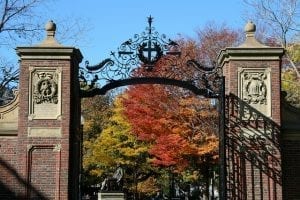The Trump administration’s last-minute visa policy revision–intended to force colleges into reopening this fall–puts many students in an incredibly difficult position.
Harvard, MIT, and other U.S. universities have filed a lawsuit against the Trump administration over its decision to potentially deport international students whose fall courses have gone online.
Harvard—along with many other colleges and universities across the country—has already announced that its upcoming semester will be held entirely online, even for students still living on campus. The unprecedented change in instruction format is intended to curb the spread of novel coronavirus this fall and winter.
But days after Harvard finalized its decision to hold classes remotely, the Trump administration pledged to invalidate the legal status of F-1 and M-1 student-visa-holders who remain in the United States without being enrolled in at least one offline course.
According to CNN, approximately 5,000 international students are affected by the order—at Harvard alone.
“The order came down without notice—its cruelty surpassed only by its recklessness. It appears that it was designed purposefully to place pressure on colleges and universities to open their on-campus classrooms for in-person instruction this fall, without regarding to concerns for the health and safety of students, instructors, and others,” Harvard University President Larry S. Bacow said in a statement.
As LegalReader reported earlier this week, Department of Homeland Security Acting Chief Ken Cuccinelli practically admitted as much.
In an interview with CNN, Cuccinelli implied that the DHS–which oversees U.S. Immigration and Customs Enforcement–revised its visa guidance to force schools to conform to the Trump administration’s coronavirus narrative.

Saying there’s “no reason” for international students to remain in the U.S. if their classes are online, Cuccinelli added that the rules will be finalized “later this month” and “will…. encourage schools to reopen.”
Cuccinelli also said that visa requirements pertaining to online classes have always been strict—and that, in response to coronavirus, the DHS has actually relaxed its standards.
“We’re expanding the flexibility massively to a level never done before so that schools can use hybrid [instruction] models,” Cuccinelli said, proposing that “anything short of 100 percent online” would allow international students to keep their visas and remain in the country. If a student’s institution does not change its instruction format, Cuccinelli said that students could transfer to another college offering offline learning.
But Homeland Security’s new rules have the potential to wreak havoc in the lives of students as threatened by coronavirus as their universities. The Boston Globe notes that at least one Harvard student—from Belarus—has already been denied entry to the United States because of the school’s decision to take classes online.
Bill Lee, an attorney for Harvard, told Judge Allison Burroughs that the pseudonymous student is in an exceptionally difficult position.
“He lost his ticket,” Lee said, explaining that the student had attended Northfield Mount Hermon School in Western Massachusetts before being admitted to Harvard as a freshman. “He doesn’t know quite what to do.”
Other students—whose stories were partially detailed by LegalReader yesterday—face similar dilemmas: one Venezuelan PhD student may be forced back to her home country for the first time in three years, even as political instability and civil unrest seriously threaten Venezuela’s internal security.
That hasn’t stopped President Donald Trump from lashing out at universities attempting to protect the public health: the commander-in-chief has repeatedly accused colleges of trying “to take the easy way out.”
“I think they ought to be ashamed of themselves, you want to know the truth,” Trump said.
However, the lawsuit against the administration alleges that the Trump administration’s decision is unlawful and constitutes a violation of the Administrative Procedures Act, putting international students in an “untenable situation”: either staying enrolled in the online classes offered by their universities, at risk of losing their visas, or attempting to transfer, last-minute, to other institutions.
“Just weeks from the start of the fall semester, these students are largely unable to transfer to universities providing on-campus instructions, notwithstanding ICE’s suggestion that they might do so to avoid removal from the country,” the lawsuit states.
“Moreover,” the suit says, “for many students, returning to their home countries to participate in online instruction is impossible, impracticable, prohibitively expensive, and/or dangerous.”
CNBC notes that the University of California has also joined Harvard and MIT as a plaintiff.
Additionally, the University of California is seeking a temporary restraining order and permanent injunction to prevent the Department of Homeland Security and ICE from enforcing the order.
“The idea that the federal government would add to the burden of students and universities working to navigate this global health crisis beggars belief,” the University of California said in a statement. “UC will fight this blatant disregard for the law and public health with all the legal means at our disposal.”
Sources
Harvard and MIT sue Trump administration over online-only instruction for foreign students in the US
Harvard student reportedly denied entry to US as university sues to block ICE visa policy
How the Trump Administration is Manipulating International Students to Reopen Colleges
UC will sue Trump administration over international student ban, joining Harvard, MIT


Join the conversation!